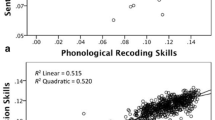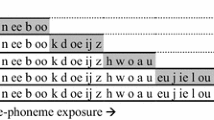Abstract
This study examined whether phonological and cognitive tasks correlate with beginning reading acquisition in Hellenic populations under two different instructional approaches: a whole language approach supplemented by implicit coding instruction through incidental learning, as used in Cyprus, versus the syllable-splitting approach characterised by explicit decoding instruction, as used in Greece. Planning, attention, simultaneous, and successive processing tasks together with three phonological coding tasks (Oddity task, Phoneme Elision, and Sound Isolation) were administered to 50 Greek and 50 Cypriot Grade 1 students. Word Attack and Word Identification were also administered to measure early reading competency. The main findings of the study were as follows: (a) significant group differences were revealed in word-decoding accuracy but not in realword reading accuracy, an expected finding in a system characterised by high grapheme-phoneme consistency; (b) successive processing and phonological coding consisted of the fundamental abilities that differentiated the Greek from the Cypriot first-graders; and (c) the Greek group exhibited a higher linguistic ability than the Cypriot group. This was facilitated by the use of the distal cognitive processes to reading, that is, successive and simultaneous processing. The discussion focuses on the need to reconsider the nature of early reading instruction in languages such as Greek with high grapheme-phoneme consistency.
Résumé
Cette enquête examine phonologiquement et cognitivement les méthodes nécessaires pour le début de l’acquisition de la lecture dans la population Hellénique, en deux différents types d’instruction: toute la langue d’un approche supplémentaire, sous-entendu, d’une instruction codée d’un enseignement symptomatique, comme il est utilisé en Chypre, contre l’approche division de la syllabe, caractérise de l’instruction explicite du décodage, utilisé en Grèce. Le plan, l’attention, la simultanéité, les méthodes successives du processus, avec les trois taches phonologiques (la tâche de la singularité, l’élision du phonème et l’isolation du son) étaient donnes aux 50 étudiants Grecs, et 50 étudiants Chypriotes de premier degré. L’attaque du mot et son identification étaient aussi utilisées pour tester la première compétence de la lecture. Les résultats de l’enquête étaient: (a) des différences significatives étaient révéles à la précision du décodage du mot, mais ce n’était pas le cas à la précision de la lecture du vrai-mot, un résultat normal dans un système caractérisé d’une haute consistance du graphème-phonéme; (b) un progrès successif et décodage phonologique qui différencient les étudiants du premier degré entre la Grèce et le Chypre et (c) le groupe grec a démontré une habileté linguistique plus élevée que le groupe chypriote. C’était facilite de l’usage d’un processus cognitif double, qui est un processus successif et simultané. La discussion est centralisée sur la nécessité de reconsidérer la nature de la première instruction de la lecture, quand aux langues comme le Grec avec une haute consistance du graphème-phonème.
Similar content being viewed by others
References
Adams, M.J. (1990).Beginning to read: Thinking and learning about print. Cambridge, MA: The M.I.T. Press.
Anderson, R.C., Hiebert, E.H., Scott, J.A., & Wilkinson, I.A. (1985). Becoming a nation of readers: The report of the Commission on Reading. Champaign, IL: Centre for the Study of Reading.
Baddeley, A. (1986).Working memory. Oxford: Clarendon Press/Oxford University Press.
Biemiller, A. (1994). Some observations on beginning reading instruction.Educational Psychologist, 29, 203–209.
Bradley, L., & Bryant, P. (1985). Rhyme and reason in reading and spelling.International Academy for Research in Learning Disabilities, Monograph Series. 1. The University of Michigan Press.
Bryant, P.E., MacLean, M., Bradley, L.L., & Crossland, J. (1990). Rhyme and alliteration, phoneme detection, and learning to read.Developmental Psychology, 26, 429–438.
Byrne, B., & Fielding-Barnsley, R. (1993). Evaluation of a program to teach phonemic awareness to young children: A 1-year follow-up.Journal of Educational Psychology, 85, 104–111.
Byrne, B., Freebody, P., & Gates A. (1992). Longitudinal data on the relations of word-reading strategies to comprehension, reading time, and phonemic awareness.Reading Research Quarterly, 27, 141–151.
Chall, J.S. (1999). Some thoughts on reading research: Revisiting the first-grade studies.Reading Research Quarterly, 34, 8–10.
Chall, J.S. (1996).Learning to read: The great debate (3rd ed.). Orlando, FL: Harcourt Brace & Company.
Chall, J.S. (1995). Ahead to the Greeks.Issues in Education, 1, 83–85.
Chall, J.S. (1983b).Stages of reading development, New York: McGraw-Hill.
Chall, J.S., & Dale, E. (1995).Readability revisited and the new Dale-Chall readability formula. Cambridge, MA: Brookline.
Clay, M.M. (1985).The early detection of reading difficulties. Portsmouth, NH: Heinemann.
Das, J.P., & Mishra, R.K., & Kirby, J.R. (1994). Cognitive patterns of children with dyslexia: A comparison between groups with high and average non-verbal intelligence.Journal of Learning Disabilities, 27, 235–242, 253.
Das, J.P., & Naglieri, J.A. (1993).Das-Naglieri: Cognitive Assessment System (DN-CAS), standardized edition. Chicago: Riverside Publishing Co.
Das, J.P., Naglieri, J.A., & Kirby, J.R. (1994).Assessment of phonological processes: The PASS theory of intelligence. Boston, MA: Allyn & Bacon.
Das, J.P., Parrila, R.K., & Papadopoulos, T.C. (2000). Cognitive education and reading disability. In A. Kozulin & Y. Rand (Eds.),Experience of mediated learning: An impact of Feuerstein’s theory in education and psychology (pp. 274–291). Oxford: Pergamon Press.
Ehri, L.C., & McCormick, S. (1998). Phases of World Learning: Implications for Instruction with Delayed and Disabled Readers.Reading and Writing Quarterly, 14, 135–163.
Flesch, R. (1955).Why Johnny can’t read-and what you can do about it. New York: Harper & Row.
Fletcher, J.M., Shaywitz, S.E., Shankweiler, D.P., Katz, L., Liberman, I.Y., Stuebing, K.K., Francis, D.J., Fowler, A.E., & Shaywitz, B.A. (1994). Cognitive profiles of reading disability: Comparisons of discrepancy and low achievement definitions.Journal of Educational Psychology, 86, 6–23.
Foorman, B.R. (1994). The relevance of a connectionist model of reading for the “great debate”.Educational Psychology Review, 6, 25–47.
Foorman, B.R., Francis, D.J., Fletcher, J.M., Schatschneider, C., & Mehta, P. (1998). The role of instruction in learning to read: Preventing Reading Failure in at-risk children.Journal of Educational Psychology, 90, 37–55.
Freebody, P., & Byrne, B. (1988). Word-reading strategies in elementary school children: Relations to comprehension, reading time, and phonemic awareness.Reading Research Quarterly, 23, 441–453.
Frith, U. (1992). Cognitive development and cognitive deficit,The Psychologist: Bulletin of the British Psychological Society, 5, 13–19.
Goodman, K.S. (1986).What’s whole in whole language? Portsmouth, NY: Heinemann.
Gough, P.B. (1993). The beginning of decoding.Reading and Writing: An Interdisciplinary Journal, 5, 181–192.
Gough, P.B. (1984). Word recognition. In P.D. Pearson (Ed.),Handbook of reading research (pp. vol. 1, pp. 225–253). New York: Longman.
Guthrie, J.T., & Alao, S. (1997). Designing contexts to increase motivations for reading.Educational Psychologist, 32, 95–105.
Jiménez, J.E., & Guzmán, R. (2000).How do influences code-oriented versus meaning-oriented approaches to reading instruction on word recognition in a transparent orthography? Manuscript submitted for publication.
Johnston, R.S., & Thompson, G.B. (1989). Is dependence on phonological information in children’s reading a product of instructional approach?Journal of Experimental Child Psychology, 48, 131–145.
Jorm, A.F., Share, D.L., MacLean, R., & Matthews, R. (1984). Phonological recoding skills and learning to read: A longitudinal study.Applied Psycholinguistics, 5, 201–207.
Juel, C. (1988). Learning to read and write: A longitudinal study of 54 children from first through fourth grades.Journal of Educational Psychology, 80, 437–447.
Kirby, J.R., Booth, C.A., & Das, J.P. (1996). Cognitive processes and IQ in reading disability.The Journal of Special Education, 29, 442–456.
Kirtley, C., Bryant, P., MacLean, M., & Bradley, L. (1989). Rhyme, rime, and the onset of reading.Journal of Experimental Child Psychology, 48, 224–245.
Lehr, F., & Osborn, J. (1994).Reading, Language, and Literacy: Instruction for the Twenty First Century. NJ: Hillsdale, Lawrence Erlbaum Assoc.
Liberman, I.Y., Shankweiler, D., & Liberman, A.M. (1989). The alphabetic principle and learning to read. In D. Shankweiler & I.Y. Liberman (Eds.),Phonology and reading disability: Solving the reading puzzle (pp. 1–34). The University of Michigan Press.
MacLean, M., Bryant, P., & Bradley, L. (1987). Rhymes, nursery rhymes, and reading in early childhood.Merrill-Palmer Quarterly, 33, 255–281.
Naglieri, J.A., & Das, J.P. (1987). Construct and criterion-related validity of planning, simultaneous, and successive cognitive processing tasks.Journal of Psychoeducational Assessment, 4, 353–363.
Palincsar, A.S., Brown, A.L., & Campione, J.C. (1993). First-Grade dialogues for knowledge acquisition and use. In E.A. Forman, N. Minick, & C.A. Stone (Eds.),Contexts for learning (pp. 43–57). New York: Oxford University Press.
Papadopoulos, T.C., & Georgiou, G. (2000).Early reading predictors in Greek language. Manuscript submitted for publication [in Greek].
Papadopoulos, T.C., Parrila, R.K., Das, J.P., & Kirby, J.R. (1997). A cognitive approach to diagnosis of early reading problems. In A. Richardson (Ed.),Canadian Childhood in 1997 (pp. 159–168). Edmonton, AB: Kanata Learning Company.
Papadopoulos, T.C., Parrila, R.K., Das, J.P., & Kirby, J.R. (2000).Predictors of reading development in at-risk kindergarten children. Manuscript submitted for publication.
Parrila, R.K., Das, J.P., Kendrick, M.E., Papadopoulos, T.C., & Kirby, J.R. (1999). Efficacy of a cognitive reading remediation program for at-risk children in grade 1.Developmental Disabilities Bulletin, 27, 1–31.
Porpodas, C.D. (1999). Patterns of phonological and memory processing in beginning readers and spellers of Greek.Journal of Learning Disabilities, 32, 406–416.
Seymour, P.H. (2000).Orthographic development and dyslexia in English. Paper presented at the International Congress of Psychology (ICP), Stockholm, Sweden.
Share, D.L. (1994). Deficient phonological processing in disabled readers implicates processing deficits beyond the phonological module. In K.P. van den Bos, L.S. Siegel, D.L. Bakker, & D.L. Share (Eds.),Current directions in dyslexia research (pp. 149–167). Lisse: Swets & Zeitlinger.
Share, D.L. (1995). Phonological recoding and self-teaching sine qua non of reading acquisition.Cognition, 55, 151–218.
Share, D.L., & Stanovich, K.E. (1995a). Cognitive processes in early reading development: Accommodating individual differences into a model of acquisition.Issues in Education, 1, 1–57.
Share, D.L., & Stanovich, K.E. (1995b). Accommodating individual differences in critiques: Replies to our commentators.Issues in Education, 1, 105–121.
Stahl, S.A. (1994). Separating the rhetoric from the effects: Whole language in kindergarten and first grade. In F. Lehr & J. Osborn (Eds.),Reading, Language, and Literacy: Instruction for the Twenty First Century (pp. 101–114). NJ: Hillsdale, Lawrence Erlbaum Assoc.
Stanovich, K.E. (1993). Problems in the differential diagnosis of reading disabilities. In R.M. Joshi & C.K. Leong (Eds.),Reading disabilities: Diagnosis and component processes (pp. 3–31). Netherlands: Kluwer Academic Publishers.
Stanovich, K.E., Cunningham, A., & Feeman, D. (1984). Intelligence, cognitive skills; and early reading progress.Reading Research Quarterly, 19, 278–303.
Stroop, J.R. (1935). Studies of interference in serial verbal reactions.Journal of Experimental Psychology, 18, 643–662.
Torgesen, J.K. (1997). The prevention and remediation of reading disabilities: Evaluating what we know from research,Journal of Academic Language Therapy, 1, 11–47.
Torgesen, J.K., Wagner, R.K., & Rashotte, C.A. (1994). Longitudinal studies of phonological processing and reading.Journal of Learning Disabilities, 27, 276–286.
Vellutino, F.R., & Denckla, M.B. (1996). Cognitive and neuropsychological foundations of word identification in poor and normally developing readers. In R. Barr, M.L. Kamil, P.B. Mosenthal, & P.D. Pearson (Eds.),Handbook of reading research: Volume II (pp. 571–609). New Jersey: Lawrence Erlbaum Associates.
Vellutino, F.R., Scanlon, D.M., Sipay, E.R., Small, S.G., Pratt, A., Chen, R., & Denckla, M. (1996). Cognitive profiles of difficult-to-remediate and readily remediated poor readers: Early intervention as a vehicle for distinguishing between cognitive and experiential deficits as basic causes of specific reading disability.Journal of Educational Psychology, 88, 601–638.
Vosniadou, S., Archontidou, A., Mpimpou, I., & Papademetriou, F. (1994).How to create a nation of readers (Transl. In Greek). Athens, Greece: Gutenberg.
Wagner, R.K., Torgesen, J.K., & Rashotte, C.A. (1994). The development of reading related phonological processing abilities: New evidence of bi-directional causality from a latent variable longitudinal study.Developmental Psychology, 30, 73–87.
Wagner, R.K., Torgesen, J.K., Laughon, P., Simmons, K., & Rashotte, C.A. (1993). Development of young readers’ phonological processing abilities.Journal of Educational Psychology, 85, 83–103.
Whitehurst, G.J., & Lonigan, C.J. (1998). Child development and emergent literacy.Child Development, 69, 848–873.
Wimmer, H. (1993). Characteristics of developmental dyslexia in a regular writing system.Applied Psycholinguistics, 14, 1–33.
Woodcock, R.W. (1987).Woodcock Reading Mastery Tests — Revised. Circle Pines, MN: American Guidance Service.
Author information
Authors and Affiliations
Corresponding author
Rights and permissions
About this article
Cite this article
Papadopoulos, T.C. Phonological and cognitive correlates of word-reading acquisition under two different instructional approaches in Greek. Eur J Psychol Educ 16, 549–568 (2001). https://doi.org/10.1007/BF03173197
Received:
Revised:
Issue Date:
DOI: https://doi.org/10.1007/BF03173197




